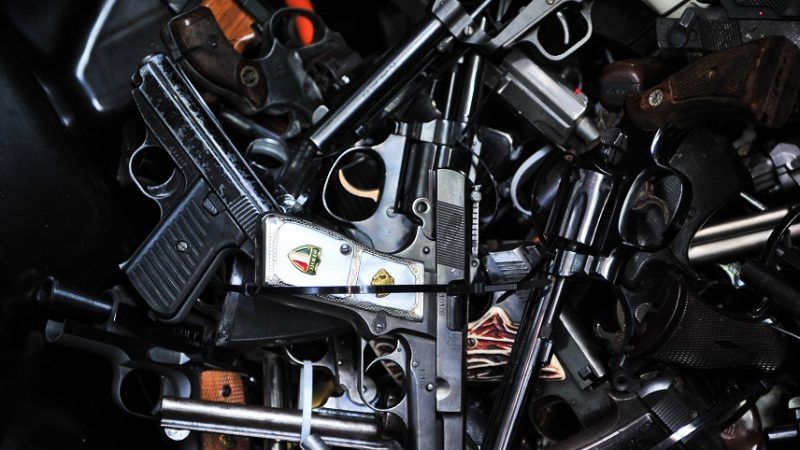Lawmakers Should Avoid Rush to Ramp Up Gun Confiscations
California's gun registration program is a mess.

An Associated Press report last week sounded rather shocking. State authorities conducted a raid in Los Angeles, where they "seized more than two dozen guns and thousands of rounds of ammunition" from a man who had reportedly been barred from owning firearms. Predictably, California Attorney General Xavier Becerra (D) bemoaned a lack of funding and a long backlog in the state's ability to collect such weapons.
"The thousands of weapons we've confiscated over the years essentially represent the low-hanging fruit," Becerra said. Expect a push for more power and resources for the state Department of Justice, even though its gun-confiscation system may be fraught with error. Gun-rights groups say 35 percent to 60 percent of the people on the Armed Prohibited Persons System shouldn't be on the list.
The latest news says much about the perils of gun registration (or our system that is not called registration, but is awfully close to it), about the failure of agencies to maintain updated lists and protect our liberties, and about the counterproductive approach from the people we most expect to protect our gun rights. On the last point, I'm referring to California Republicans.
We are the only state with such a system. Dating back to 2007, APPS cross tabs lists of firearms owners with lists of people whose criminal convictions or mental illness ban them from owning them. If, say, you bought a shotgun for home protection and your wife files a restraining order during a nasty divorce, the Department of Justice may send agents to confiscate that 12 gauge.
That may be a good thing, but before the department gets more resources it ought to make sure the list it works from is as accurate as possible. The state auditor in 2013 looked at APPS and found that in some cases the department goes after people whose names shouldn't be on the list. Typically, people don't know the process for reinstating their rights. The auditor found the agency was mistaken in three of the eight cases it reviewed.
This is typical of bureaucracy. And the response from politicians has been sadly typical, too. It's no surprise that Democrats are largely hostile to private gun ownership, as evidenced by the new gun restrictions they propose every year. For instance, Becerra, as a member of Congress, received an "F" from the National Rifle Association.
After the horrific murders at Sandy Hook Elementary School in 2012, the state called for an audit of APPS. In 2015, when Sen. Kamala Harris (D) was the state attorney general, some legislative Republicans sent a letter to state Senate Leader Kevin de León (D-Los Angeles) after the first audit report was released. They blasted Harris for failing "to address the APPS backlog and meet the commitments they made to the legislature."
So the GOP should be happy that the new attorney general is trying to deal with the estimated 10,000 people who reportedly own guns that they no longer are allowed to own, right? This is called being "too clever by half," given that the GOP letter was able to embarrass a rising Democratic official who was running for Senate. What can they say now that the current attorney general is trying to live up to the demands in their letter?
There are myriad problems with APPS. For starters, it's unlikely that this approach does much to make our state a safer place. We're still a long way from the movie Minority Report, where "pre-crime" psychics can reliably predict who will commit mayhem. Law-enforcement already has an incentive to track down dangerous criminals. APPS, critics say, focuses resources instead on tracking down people who technically are in violation, but pose no real danger. This means heavily armed agents showing up at people's doorsteps to deal with what may be a paperwork miscue.
The bigger problem is that lawmakers from both parties have bolstered what I've called "the infrastructure for confiscation." Legislators routinely add to the list of crimes, even misdemeanors, that require the forfeiture of gun rights. Legislators frequently offer bills that would retroactively ban the ownership of new categories of weapons.
In a true registration system, the government registers a particular gun to a particular person. But the state maintains various lists of gun owners and often the specific guns they own, so APPS provides a potentially powerful tool that could help find owners after a weapon later is deemed illegal. We expect Democrats to be fans of such a system, but it's disconcerting that the main GOP objection in recent years is that the state hasn't been aggressive enough.
Everyone wants firearms kept out of the hands of the wrong people. But before California legislators use the latest news stories to ramp up funding for the state's controversial gun program, they ought to at least insist that the program really is achieving its stated goals and not wasting resources and violating people's basic rights.
This column was first published by the Orange County Register.


Show Comments (24)